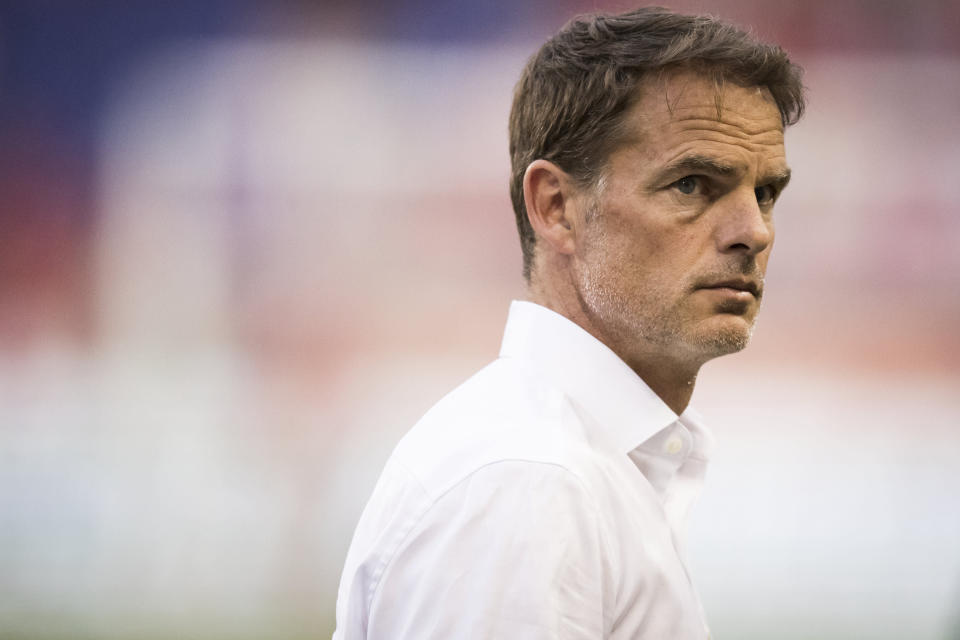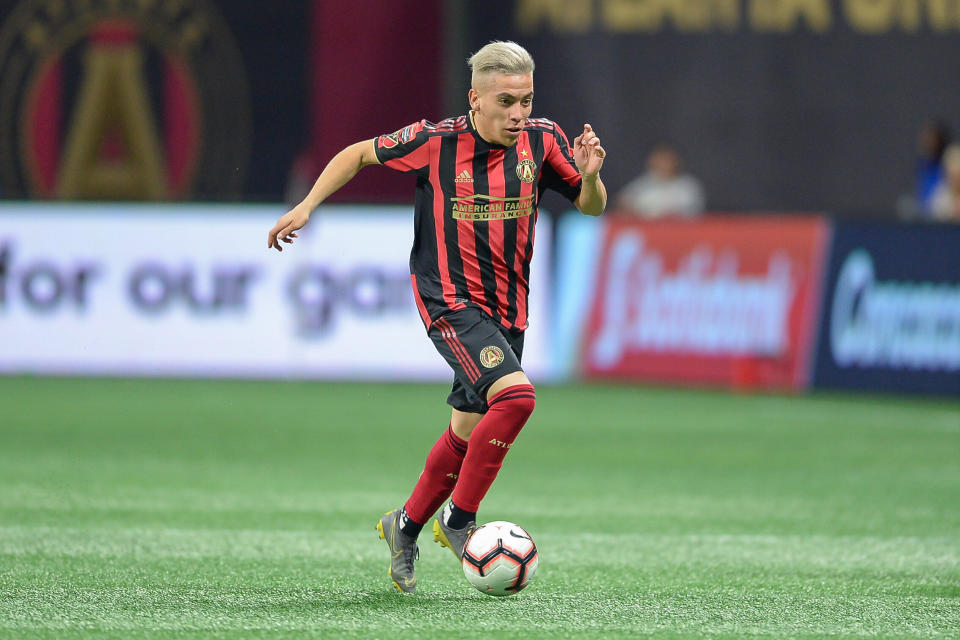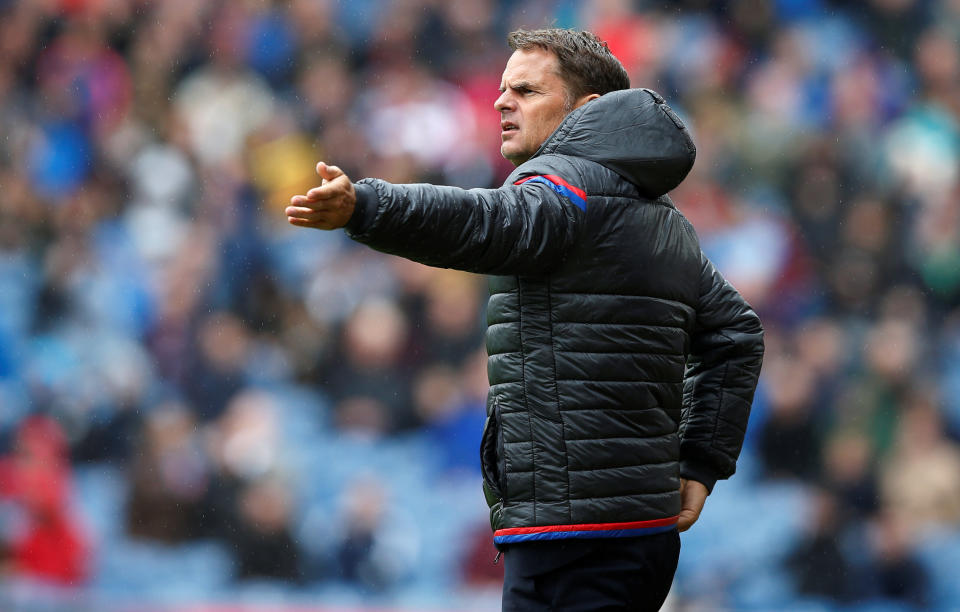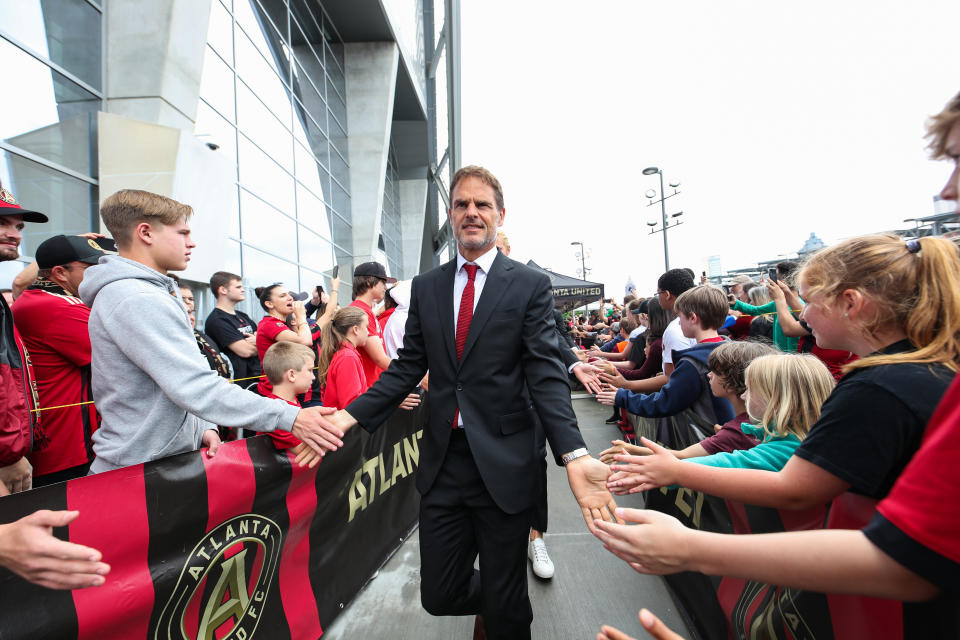Frank de Boer is (largely) unchanged

It was high time for a team meeting.
Time to talk through it all. To set some things right. Because it couldn’t go on like this, four winless games into Atlanta United’s Major League Soccer title defense. So for two hours in early April, Frank de Boer, his staff and the players talked. The Dutch head coach insisted that everybody speak up, unburdened themselves.
Since that meeting, Atlanta United has strung together a record of eight wins and three losses, including a five-game winning streak, and rocketed up the Eastern Conference, trailing the first-place Philadelphia Union by just two points with a game in hand.
Since that meeting, says de Boer, they’ve yet to have a sloppy training session.
And since that meeting, the question of whether de Boer’s managerial career was collapsing has been laid to rest. Because after his 2016 appointment at Inter Milan lasted just 85 days and 14 games, and his 2017 spell with Crystal Palace was curtailed after only 77 days and five games, there were questions. And so the panic among Atlanta fans after that rotten start was understandable.
So they all talked. About expectations. About attitude at practice.
“The chemistry between us, the staff, and the players wasn’t there yet,” de Boer tells Yahoo Sports. “The attack was very good last year. But we thought we could get much better at defending. So that’s what we were heavily focused on in practice. But they didn’t enjoy all that defending.
“We asked them, ‘How do you see things? What are our core values? What’s important to us?’” de Boer continues. “It was very productive.”
It was this clearing of the air, more than anything tactical, that turned Atlanta’s results around.
“At the end of that meeting, we all made a commitment to ourselves,” midfielder Julian Gressel says. “To try to be better. To work on things we had discussed. To really turn this thing around and not waste the time we have together. Ever since then, we’ve all been a bit more on the same page and all put a little bit more energy towards it all and you can see the rewards on the field.”
It was better communication that helped Frank de Boer change his lot.
***
In lots of ways, Frank de Boer is the same.
He is 18 minutes early for an interview at the team hotel, of course. Seven games and six victories after that team meeting, and on the eve of an unlucky 1-0 loss to a 10-man New York Red Bulls, de Boer seems sanguine. He chats in Dutch over a double-espresso, never mind that it’s almost 8 p.m.
He looks tan and fit. At 49, it’s all still there, the heavy brow, the blue eyes – one darker than the other after a virus damaged his left iris – the slightly slurry speech, the dark blonde hair parted neatly on the side, albeit a little thinner at the top. He’s still every bit the former Oranje captain who starred for Ajax and FC Barcelona as one of the best defenders of his generation.
The legendary long balls and free kicks are still there too. “He still has quality,” says Atlanta’s technical director Carlos Bocanegra, a former U.S. national team captain.

In some ways, Frank de Boer is different.
He’s learned to adapt. He knows it can’t always be his way, as it had been at Ajax – where his way was also the club’s way, after 15 years there as a player and another decade as a coach, during which he won four Eredivisie titles.
The famously competitive de Boer tends to stay after practice to hit free kicks around a dummy wall. Sometimes with a staffer in goal. Often with 20-year-old attacking midfielder Ezequiel Barco. According to witnesses, he’s still got that, too. But he saves it for after practice now, one of the adjustments he’s made after his brief stint with Palace, where his frequent and zealous participation in practice apparently grated on some players.
Another adjustment: recreativo. To South Americans, of which United has seven, almost all of them key players, the last practice before a game should be loose and relaxing. They usually play a pickup game that’s more about goofing off and lightening the mood than gaining sharpness. “I hate it,” de Boer says with his signature candor. “But they love it. So what matters more?”
He leaves them be. He’s learned to accept that he can’t control everything. That in some cultures, teams practice in a different way than what he’d grown up with at Ajax, where everything is serious and tightly regimented all the time. “So you have to accept that and try to reach them in other ways,” de Boer says. “I’ve had to adjust to that.”
***
As a coach, de Boer is the spawn of every great Dutch manager of the last half-century. As a 14-year-old, he was spotted and brought to Ajax by Johan Cruyff, along with twin brother Ronald. He made his Dutch national team debut under Rinus Michels. He became a star under Louis van Gaal; the Oranje captain under Guus Hiddink. He played for Leo Beenhakker and Dick Advocaat. He was Bert van Marwijk’s assistant when the Dutch reached the final of the 2010 World Cup.
He takes a little from all of them. Michels’ adherence to possession. Cruyff’s love for the game and attention to detail. Van Gaal’s discipline and principles. Hiddink’s bonhomie. But he’s developed his own philosophy, his own brew from all of those ingredients.
It was, in a sense, risky taking the Atlanta job. The club was the MLS champion, going into just its third season, and departing manager Tata Martino was popular with both fans and players. “You arrive and you can’t really do a whole lot better, other than in CONCACAF,” de Boer says. “But I don’t mind the pressure. I, of course, studied how we played [before his arrival] and I think we can still improve. We’re trying to control the game more than last season.”
De Boer, who speaks both English and Spanish, has taken a different approach than Martino, a charming Argentine who spoke no English and adhered to the South American tradition of keeping a distance from his players. During preseason, de Boer spent a lot of time playing cards and eating with his squad members. On the road, he tends to hang around the hotel lobby, mingling with players.
“We obviously didn’t have that at all, that relationship with the manager for the past two years,” Gressel says. “Tata was really just never seen other than on the training field or when we had a game. He wasn’t in the hotel lobby, trying to talk to you. Sometimes I wouldn’t see him for days. Frank is more of a presence in the locker room.”
***

In the unflattering view, de Boer was out of his depth at Inter and naïve at Palace. Perhaps a more considered take is that at Inter, he was thrown into a political snake pit that devoured six managers in 2016 and 2017 alone, without the backing to stand up to a powerful squad. At Palace, he was expected to play more attractive soccer with a plodding team, yet didn’t get the time or players to fulfill that mandate.
As the Guardian put it: “Why sack de Boer for managing like de Boer?”
Now, with Atlanta, it isn’t so much that he’s doing things radically differently than he did at Inter or Palace. It’s just that here, de Boer gets the chance to, well, work. For starters, he only answers to two people, Bocanegra and club president Darren Eales, whom he knew from when Eales worked at Tottenham Hotspur and de Boer was a managerial candidate.
De Boer sees advantages in working for a club that’s only a few years old. “There isn’t that much club history,” he says. “So there’s no former chairman taking shots in the press. You don’t have to deal with that stuff. You can focus much more on the football here.”
He doesn’t have to worry about his owner second-guessing him. “Arthur Blank’s baby is [the Atlanta Falcons], although that’s starting to change,” de Boer says. Blank, the septuagenarian co-founder of The Home Depot, is starting to see the appeal of soccer, thanks to the enormous crowds in his sparkling Mercedes-Benz Stadium. But he would never dare interfere in a sport he openly admits he’s still learning.
“At Palace, the chairman [Steve Parish] didn’t know much about football, although he was learning things,” de Boer says. “But he had his own opinions. And I didn’t listen to those, but then when things weren’t going well, you’d hear ‘I told you so.’”
“At Inter, we spent so much time dealing with politics, with agents,” de Boer continues. “That took up 50 percent of my time, when it should have been 10 percent. A [player’s] agent told me, ‘If I’d known you weren’t going to start my player, I would never have hired you as manager.’ That’s how much influence he had on who was in charge.”
De Boer figures it takes about six months to implement his playing style. But in order to get to six months, you first have to be given six months.
Like at Inter and Palace, he has a broader vision for a long-term project. He wants to better integrate the reserve team and expand the academy. That’s part of what appealed to Bocanegra and Eales. “There was a lot of overlap there. Our thoughts and philosophy were aligned,” Bocanegra says.
The other part is that de Boer was hungry to get his career back on track. “He had a little bit of a chip on his shoulder,” says Bocanegra. “The way things went at Palace and Inter, they were very quick stints. He had something to prove. We also liked that aspect. He had a hunger. He was eager to get back into it and prove himself.”
That’s why nobody panicked after that terrible start. Bocanegra recognized that injuries, bad luck, unusual underperformances and an abbreviated preseason were all factors. So was the departure of attacking lynchpin Miguel Almiron for Newcastle United. A new manager, who wanted to make tactical tweaks, needed time.
“We knew there were going to be some bumps and bruises,” Bocanegra says. “We stuck behind him. We saw the work that they [the coaching staff] were doing every day, trying to make little adjustments, the little tweaks in training and in the preparation. We were getting punished for a lot of mistakes that last year we weren’t getting punished for. We knew it was going to be tough. We knew we were going to be giving him time. They were improving, week by week. We were not concerned about the big picture.”
That’s why nobody around the club really considers the recent run of wins a turnaround so much as the inevitable result of the progress made.
***
Just as Bocanegra picked up de Boer from his hotel the day he interviewed, he got a call from his agent. He also had a job offer from Belgian powerhouse Anderlecht. Frank’s wife Helen was partial to Brussels, but de Boer had a good feeling about Atlanta.
“Anderlecht is sort of Belgium’s Inter Milan – there’s always something amiss,” he says. “I didn’t want that.”
Sure enough, Fred Rutten, the manager ultimately hired, was fired after just 13 games. Two weeks ago, Anderlecht announced that Manchester City captain Vincent Kompany would be returning to his childhood club as player-manager.

“I don’t mind being under the bright lights [in a high-profile European job], but I want to be somewhere where I can focus on my work and don’t have to constantly keep an eye out to see if anybody is undermining me,” says de Boer. Above all, he just wants to get back to coaching.
So he’s settled in. He lives on the 23rd floor in Midtown Atlanta, by Piedmont Park. He can see the stadium from his apartment. Helen has taken a liking to it. His three grown daughters will cycle in and out over the summer.
De Boer says he took a big pay cut from his last two jobs but signed a four-year contract. He’s stopped worrying about his career trajectory, about his ascent on the ladder. “I’m not thinking about that,” he says. “I really like being a coach. I don’t know what’s next. My job is to perform with Atlanta. I like it here.
“I’ve had two slip-ups, so I know what that feels like. I want it to feel good again, where I have an idea that I’m executing and that we’re working towards. Just like it was at Ajax. And then we’ll see. I’m not worried about [my career]. I’m not here for the money. The most important thing is that I’m enjoying myself.”
De Boer is here for the long haul.
Leander Schaerlaeckens is a Yahoo Sports soccer columnist and a sports communication lecturer at Marist College. Follow him on Twitter @LeanderAlphabet.

